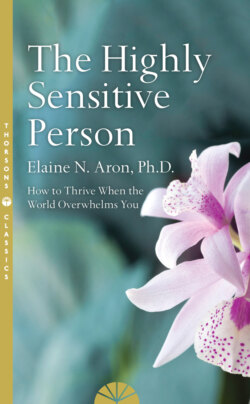Читать книгу The Highly Sensitive Person - Elaine N. Aron - Страница 10
And Some Things to Say to Non-HSPs
ОглавлениеSometimes non-HSPs feel excluded and hurt by the idea that we are different from them and maybe sound like we think we are somehow better. They say, “Do you mean I’m not sensitive?” One problem is that “sensitive” also means being understanding and aware. Both HSPs and non-HSPs can have these qualities, which are optimized when we are feeling good and alert to the subtle. When very calm, HSPs may even enjoy the advantage of picking up more delicate nuances. When overaroused, however, a frequent state for HSPs, we are anything but understanding or sensitive. Instead, we are overwhelmed, frazzled, and need to be alone. By contrast, your non-HSP friends are actually more understanding of others in highly chaotic situations.
I thought long and hard about what to call this trait. I knew I didn’t want to repeat the mistake of confusing it with introversion, shyness, inhibitedness, and a host of other misnomers laid on us by other psychologists. None of them captures the neutral, much less the positive, aspects of the trait. “Sensitivity” does express the neutral fact of greater receptivity to stimulation. So it seemed to be time to make up for the bias against HSPs by using a term that might be taken in our favor.
On the other hand, being “highly sensitive” is anything but positive to some. While sitting in my quiet house writing this, at a time when no one is talking about the trait, I’ll go on record: This book will generate more than its share of hurtful jokes and comments about HSPs. There is tremendous collective psychological energy around the idea of being sensitive—almost as much as around gender issues, with which sensitivity is often confused. (There are as many male as female babies born sensitive; but men are not supposed to possess the trait and women are. Both genders pay a high price for that confusion.) So just be prepared for that energy. Protect both your sensitivity and your newly budding understanding of it by not talking about it at all when that seems most prudent.
Mostly, enjoy knowing that there are also many like-minded people out there. We have not been in touch before. But we are now, and both we and our society will be the better for it. In chapters 1, 6, and 10, I will comment at some length on the HSP’s important social function.
